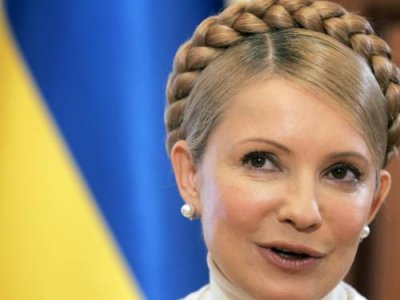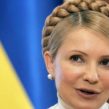
IMF to Resume Assisting Ukraine
Publication: Eurasia Daily Monitor Volume: 6 Issue: 79
By:

The IMF’s mission visited Ukraine April 8-17 and was satisfied with the results of its talks with the government. It will recommend that the IMF board resumes financial assistance to Ukraine in May. This means that Ukraine must avoid a critical depletion of its foreign exchange reserves (forex) and consequently a sovereign default -which has been feared by many observers. In order to qualify for IMF financing, Ukraine agreed to implement several unpopular economic measures. Also, seven banks will now be bailed out by the government.
Ukraine was one of the first countries to apply for IMF assistance when the global financial crisis erupted last fall. The IMF approved a $16.4 billion stand-by arrangement for Ukraine in November, and its first $4.5 billion tranche came the same month. The second tranche was expected on February 15, but it did not arrive since the IMF and Prime Minister Yulia Tymoshenko failed to agree on the ways to finance the budget deficit and support banks.
Ukraine could not afford a long dispute with the IMF. The National Bank of Ukraine’s (NBU) forex reserve shrank from $31.5 billion in January to $25 billion in March as it sold dollars in order to support the national currency, which had lost almost 40 percent of its value since last August. In order for the IMF mission to return, Tymoshenko agreed to give more independence to the NBU and to finance the 3 percent budget deficit by non-inflationary means such as loans. Also, ahead of the IMF’s mission returning to Kyiv, parliament agreed to increase the excise tax on alcohol and tobacco (Ukrainska Pravda, March 31).
The IMF mission focused its concern on three areas: the cash-strapped Naftohaz Ukrainy national oil and gas company, the unreformed pension system, and financial sector restructuring aimed at restoring public trust in the banking system. Tymoshenko suffered a major setback early on April 14, when parliament refused to include on its agenda the crucial bills on Naftogaz and pension reform, which prompted Yushchenko and Tymoshenko to accuse each other of torpedoing the talks with the IMF for political reasons. In reality, this showed the political weakness of both, with Tymoshenko unable to muster a majority in parliament and Yushchenko having no effective control even of his small caucus (Channel 5, April 14).
Tymoshenko finally decided to circumvent parliament, on the same day adopting the measures required by the IMF to cover the state budget deficit at an emergency meeting of her government. Although there were doubts about the legality of the move, it was supported by Yushchenko. The measures included allowing private individuals to buy government bonds, increasing the price of gas by 2 percent for selected industries and by 5 to10 percent for high-income households (also increasing their electricity tariffs), partially waiving Naftohaz’s tax debt, allowing government bodies to sell additional services and increasing the pension tax for small businesses (ProUA, April 14).
On April 15, the government and the NBU announced that seven banks would be bailed out in line with agreements reached with the IMF. It was decided that the state would take 75 percent, plus one share stakes in these banks in exchange for saving them; receiving an equivalent of $2.6 billion out of the $5.7 billion earmarked for the recapitalization of banks in the state budget. This means that more banks might be bailed out at a later date. Out of more than 180 banks in Ukraine, 26 larger ones fit the government’s criteria for the bailout, but the owners of only seven of them accepted the government conditions, said Tymoshenko. After the recapitalization, due to start within the next three to four weeks, the banks will be sold at auctions, she added (Interfax-Ukraine, April 17).
The banks to be bailed out are: Nadra, Finansy i Kredit, Ukrgazbank, Rodovid, Ukrprombank, Kyiv and Imexbank. Only one of them, Nadra, is among the country’s top ten financial institutions. Finansy i Kredit risks being dropped from the group as its owner, metals tycoon and Tymoshenko’s political ally Kostyantyn Zhevaho, is reluctant to lose control over it (Zerkalo Nedeli, April 21).
The IMF mission said it was satisfied with the measures taken by the Ukrainian government. It observed stabilization within Ukraine’s economy and believes it avoided more significant damage caused by the financial crisis. The IMF mission said its board might increase the second tranche of the stand-by loan to $2.8 billion from $1.84 billion -due to arrive by mid-May. The mission completed its work, but it will soon assess the possibility of disbursing the third tranche, expected to equal $2.8 billion (www.imf.org, April 17).
Ukraine previously expected to receive a $3.75 billion third tranche in May. Tymoshenko asked the IMF to disburse the second and third tranches at once (Interfax-Ukraine, April 9). It now appears that they will arrive simultaneously, owing to the delay in the second tranche. Despite that delay, a 30 percent year-on-year industrial output decrease in the first quarter, and the incessant political squabbles, Ukraine’s economy has proven to be more robust than many expected. Yushchenko and Tymoshenko saw signs of an approaching recovery in the March statistics (UNIAN, April 15; Interfax-Ukraine, April 16). The IMF apparently shares their cautious optimism.




